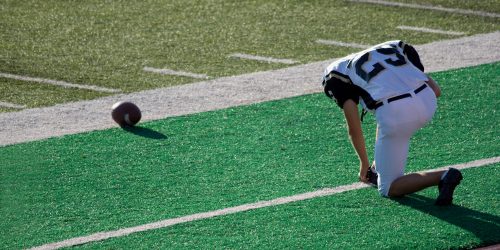
iStock
Essentially, they reasoned that the coach’s rights to free speech and the free exercise of religion protected this moment of “personal” prayer and devotion. The coach was terminated after three episodes of kneeling and praying, without his students, in the middle of the football field after school games.
A shocking targeting of private religious devotion, right? Perhaps not, once the larger facts are understood.
Indeed, it is remarkable that a Court so intent on carrying out the directives of “history and tradition,” as the Kennedy majority asserts, seems so disinterested in the actual history and tradition of the behavior of the coach in the case before it. If they had paid it any real attention, they would have to see the final three episodes of post-game prayer at the 50-yard line without his students was a continuation of the years of practice of doing the same thing with his students in both the locker room and field, accompanied by overtly religious sermonettes.
Given this history and context, the actions of the coach in endorsing and subtly coercing his students (what student athlete isn’t looking to curry favor with his coach to gain extra playing time or a preferred scholarship recommendation) to engage in his approved worship seem readily apparent. Indeed, these final “alone” prayer sessions were not truly alone, as they had become a political cause célèbre. In reality, the coach was accompanied by students from the opposing team, as well as prominent state political officials, all anxious to wrap their political bona-fides with the sweet sacramental incense of football and prayer.
The Lemon test the court overruled, which required state neutrality towards religion and forbade government officials from appearing to endorse a religious view in their public activities, was not perfect. But it contained vital values of the nation’s commitment to maintaining a politically neutral public space for its religiously diverse citizenry. The Court has now retreated to an undefined reliance on “history and tradition” and Justice Kennedy’s old coercion test, which was rightly rejected decades ago as being insufficient to protect the religious freedom of minorities. Setting the methods of the inquisition as the baseline for inappropriate official religious conduct seems an awfully low level of protection for religious minorities.
Kennedy’s behavior did not bring peace and unity. His “religious” actions caused division – the High School head coach resigned, expressing concern over threats of violence generated by the controversy, and three of the five assistant coaches left as well. In light of these facts, it seems fair to ask if prayer is being used as a political football by sincere but misguided religious zealots, rather than as a genuine devotional exercise by people trying to bring peace and unity to their communities.
I teach at a Seminary and generally believe that prayer is a good thing. But at times prayer can become politicized, and even weaponized, so that social and religious minorities feel excluded from the larger community. When this happens, prayer warriors risk becoming prayer bullies, something that Christ had rather strong things to say about. Better, he said, to pray in “your room” at home, then on the “street corners” or “football fields,” (well, he actually said “synagogues,” but football fields are essentially the temples of our day), to “be seen by others.” These, Christ said, “have received their reward.” Matt. 6:5-6.
Some Christians wonder if the praying Coach is like Daniel, who was thrown to the lions for praying at his window. But unlike the Coach, Daniel’s prayers, though observable by the public through his open window, were in his own home. Nobody could argue that he was doing this on government time or property.
Nobody was stopping the Coach from praying in his own home, in his car, in his office, or even quietly on the sidelines. He wanted to elevate his prayer into a public ritual, using a platform that he only had by virtue of his state job. As a public official that is simply a conflict of interest under our Constitution, at least as historically understood.
Given sufficient official leeway, it is all too easy for prayer to be used for bullying rather than community building. For the Court to find such behavior protected, rather than proscribed, by the First Amendment is, in my view, deeply troubling and signals a new and concerning era in Establishment Clause jurisprudence.
Such developments have been predicted, however, in our prophetic heritage. We are told that there will be a final conflict over government promoted and endorsed worship, as described in Revelation 13. We should always be concerned when the government makes more room for public officials to use their positions and power, especially over impressionable youth, to promote their personal worship.
Nicholas Miller is the Lake Union Public Affairs and Religious Liberty director.